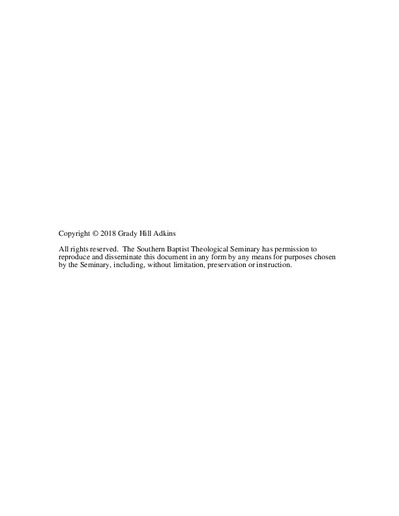| dc.description.abstract | The purpose of this mixed methods study was to determine areas where students attending private colleges or universities found themselves least equipped to defend core Christian doctrines of the faith to define areas that churches and parents can better partner in equipping young adults with apologetic and foundational truths. Based on a review of significant texts, research reports that anywhere from 30 to 60 percent of young adults spiritually decline and disengage from the church. With this in mind, the research of this study examined the factors relating to the diminishment in confidence of core Christian doctrines among college students in private colleges and universities.
Using a short Christian orthodoxy scale that consisted of six questions foundational to Christian belief, quantitative data was collected from college seniors or recent graduates of private higher educational institutions based on the core Christian beliefs they held when they entered college compared to beliefs when the graduated from college. Using a dependent t-test, the results of this study this study report a significant decrease in confidence of core Christian doctrines among college students in private colleges or universities. The exception were students who attended a Christian college or university where the research of this study did not report a significant decrease of confidence in core Christian doctrines during their college years.
College students attending private schools reported eleven major religious themes that were difficult to believe or defend. These themes included issues surrounding theodicy, God, gender roles, the Bible, Jesus, faith, knowledge, creation, the spiritual realm, free will, the church, and morality. Core Christian doctrines that had the greatest diminishment during the college years are the following, in descending order: (1) the Bible was inspired by God; (2) Jesus Christ was the divine Son of God; (3) God is aware of people’s personal actions; (4) Jesus was crucified, died, and buried but arose from the dead on the third day; (5) God is not an old superstition; (6) God provided a way for the forgiveness of sin through Jesus.
The qualitative research process consisted of six interviews for illustrative purposes. The follow-up interview consisted of three sections that included (1) two questions regarding beliefs about God or religion that are difficult to defend, (2) one question about religious activities the respondent and their parents practiced in their home, and (3) two questions regarding church resources for in-home discipleship.
KEYWORDS: faith; foundation; diminished confidence; Christian doctrines; private college; private university; church dropout; moralistic therapeutic deism; Christian formation; faith development, Christian Smith, Short Christian Orthodoxy Scale | en_US |

